Stories
Marnella Fashions
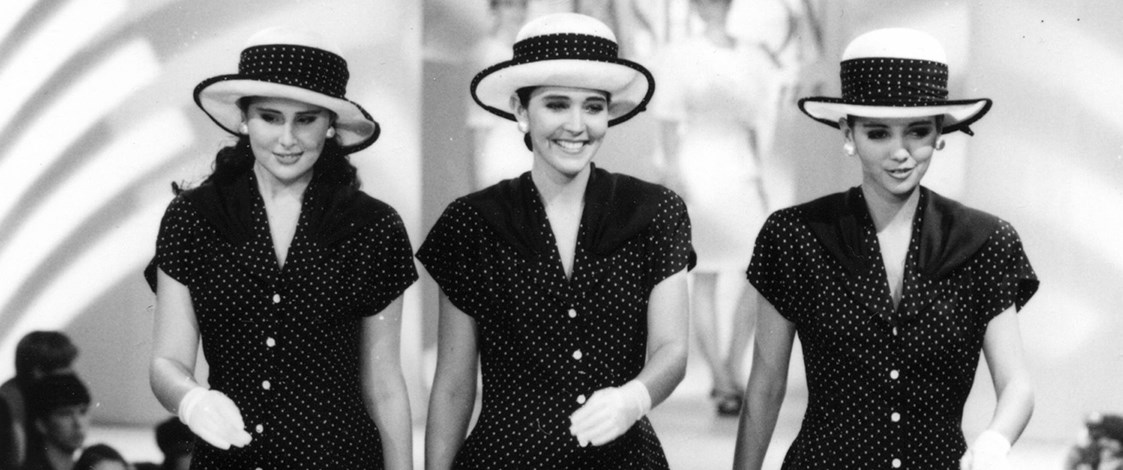
In 1982, New Zealand’s clothing trade magazine Apparel wrote: "Combined with their large manufacturing plant at Pukekohe and their philosophy of great style and workmanship, selective fabrics and value for money, the Harrisons are a formidable trio."
The Harrisons – Marie, Frank and daughter Monique – owned and operated Marnella Fashions whose labels Chique and Marnie were sold nationwide in department stores and upmarket fashion boutiques throughout the 1980s and 1990s.
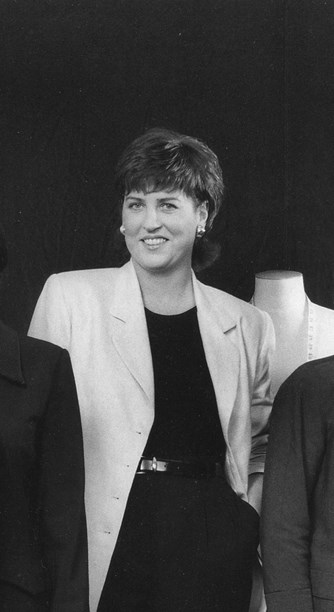
Marnella Fashions head designer Monique Harrison, 1996.
When Marie and Frank Harrison, an electrical engineer with the Dutch company Philips, emigrated to New Zealand from Holland in 1958, they lived briefly in Taihape, where Marie, a tailoress by trade, did occasional dressmaking and clothing alterations.
In 1969, the Harrisons moved to Pukekohe. David Neaves, the owner of a CMT (cut, make and trim) factory in Papakura, who was in the process of opening a satellite operation in Pukekohe, asked Marie to manage it. When, after 18 months, David Neaves decided to close the Pukekohe factory, which employed six trained machinists and six outworkers, Marie took it over. In 1971, Marnella Fashions (the name, a combination of Marie and Petronella, Marie’s middle name) was born.
"We managed to scrape together the money," recalls Marie. "An order of 70 simple shift dresses with zips in the back from Estelle Rose helped carry the day. We had no intention of having our own business but circumstances forced the decision."
From 1971 until 1981, the Harrisons operated exclusively as a contract factory. Their clients over the years included Estelle Rose, El Jay, Peppertree, Thornton Hall, Underground Fashions and Gaye Bartlett, most of whom had their own workrooms but needed help with larger orders. The company also made corporate, school and sports uniforms for events such as the Olympic Games. With the introduction of Marnella’s own labels, starting with Chique in 1981, the CMT operation continued. Later, when cheap imports threatened the local apparel industry, this helped sustain the business.
Just as her parents initially had no business aspirations, Monique Harrison never contemplated a fashion career. She says she had no idea what she wanted to do but, encouraged by her mother, she completed the two-year full-time Apparel Technology and Administration course at ATI (Auckland Technical Institute), graduating in 1977. After working elsewhere in the industry for two years, she joined the family firm.
In 1981, the Harrisons decided that, after making garments for other companies for 10 years, it was time to create their own labels. They moved into a spacious new factory (also in Pukekohe) with its own cutting facilities, stockrooms, fabric storage and a variety of machine capabilities, and took on 29 extra staff, all from the Pukekohe area.
Monique headed the design team, Marie took charge of production and Frank assumed the role of Jack-of-all-trades, attending to everything from maintaining the machines and the building to paying the bills. "We were absolute beginners," says Monique, still bemused today by the venture’s success. "Although we possessed the technical skills, we had no experience in retailing, marketing or sourcing fabrics. We learned as we went along. Luckily for us, it was a good time for local manufacturers. There were very few imports so women had to buy locally made. With the Chique label, we concentrated on after-five and special occasion wear and inadvertently filled a gap in the market we didn’t know was there."
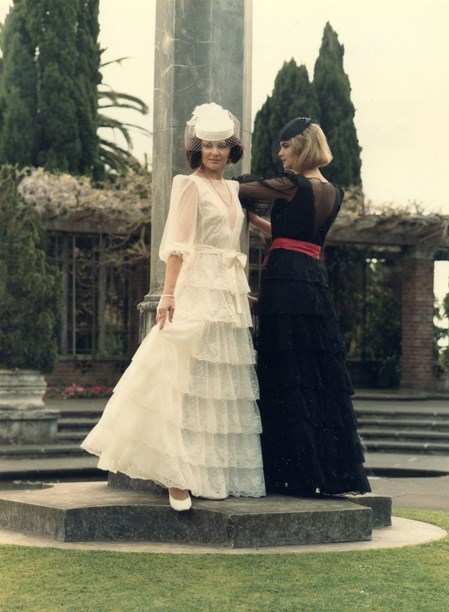
Chique by Marnella, Winter, 1982.
Monique and Marie bought the fabrics for their first collection from El Jay’s Gus Fisher who had a material surplus. The fabrics were of the highest quality and the aesthetic for fine fabrics was one they retained across their labels. Keen to support local textile houses, they always purchased the fabrics for their collections here, never offshore.
Chique made its debut at the 9th New Zealand Fashion Fair, at Auckland’s Logan Park Vacation Hotel in September 1981. The Fashion Fair, held bi-annually since the mid-1970s, was the apparel industry’s major trade event. It attracted up to 60 companies who, over a period of three days, presented their indent and in-season ranges to retailers via fashion parades and individual displays. The Fair also included fashion breakfasts, luncheons and evening get-togethers, providing rag-traders and retailers with plenty of opportunities to socialise.
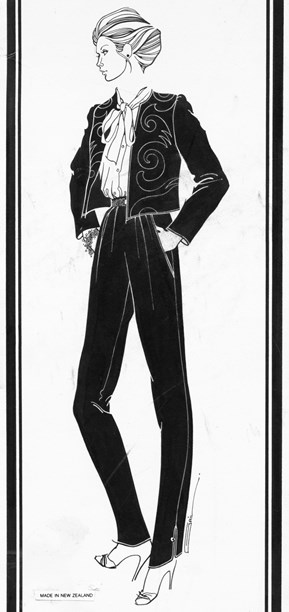
Original artwork for braided black wool pantsuit, Chique by Marnella debut collection, 1981.
Marnella Fashions continued to participate in the Fashion Fairs until they were discontinued in the mid-1980s. Marie remembers making 21 identical white lace dresses for the opening of one of their Fashion Fair parades. "The models came out wrapped in black capes and dropped them to reveal the white dresses." In one of her earliest advertising assignments, Rachel Hunter is pictured modelling a Chique white lace dress.
With its glamorous and feminine approach, Chique quickly became one of the leaders in special occasion dressing. As Apparel magazine noted: "Chique has proved to be chic with a big plus."
The Marnie label – the name a derivation of Marnella - introduced in 1982 and released initially in the top half of the country from Taupo north, targeted a younger market. The first Marnie range featured bomber jackets, knickerbockers, then at the height of their popularity, lightweight blouses and crosscut cord pants. Easy-going day dresses, semi-tailored suits and city separates were later additions.
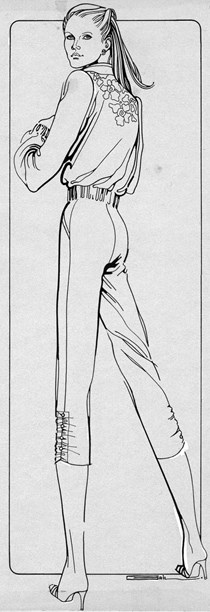
Original artwork for chintz knickerbockers, Marnie debut collection, 1982.
By 1990, Marnella Fashions employed 45 staff and supplied 80 retail outlets. All garments were produced in the Pukekohe factory, enabling the Harrisons to maintain a strict control of the quality of the product.
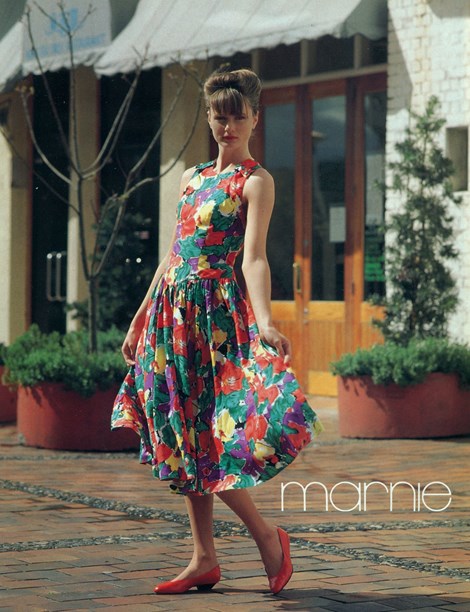
Marnie floral print dress with buttoned shoulders and gathered skirt. Summer 1990.
Initially they were advocates of promoting their fashion labels in print but discovered that supplying garments for beauty pageants such as Miss Auckland, Miss Asia Pacific and Face of the 80s was a more beneficial strategy in the long run. Also invaluable was the TV exposure gained by participation in the Corbans Fashion Collections and Salute to New Zealand Fashion, the manufacturers segment of the Benson & Hedges Fashion Design Awards.
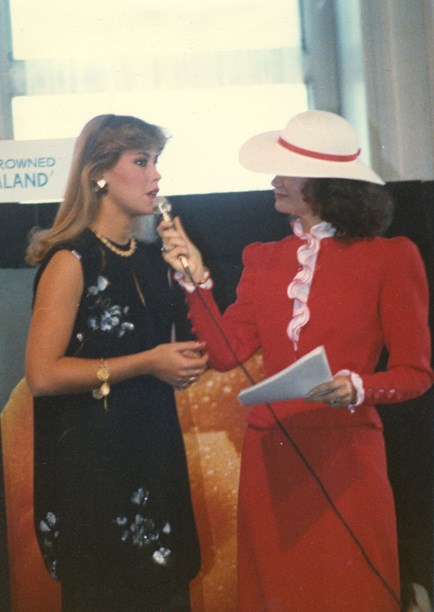
Compere Maysie Bestall-Cohen interviews Pilin Leon, Miss World 1982, during a fashion parade at the DIC. The beauty queen, who was making guest appearances at DIC stores throughout New Zealand, wears a Chique by Marnella black blouson top and skirt with ornate embroidery.
At a Corbans Fashion Collections function in 1989, Monique met Christchurch entrepreneur Merryn Corcoran who was opening a shop, MOA, in London’s Kings Road to showcase New Zealand fashion. Merryn commissioned Marnella Fashions to make garments for the shop to her designs but the venture was short-lived. Within four years, MOA closed its doors.
In 1996, at the suggestion of a Marnella stockist in Hastings, Monique was prompted to design a fashion range for the Plus Size market. Being tall and a Size 14 herself, she understood the need, in terms of design, to provide fashionable options for well-proportioned women. The new Extensions range catered to sizes 16 – 26 and Monique says it was welcomed by retailers with open arms. "If I’d been asked to design a collection for this market a few years earlier I would have declined. But the choices for women in the Plus Size range were just so limited, the issue had to be addressed."
The addition of Echo, a range of knit sportswear, in 1998, brought the total number of Marnella labels to three, Chique having been discontinued earlier in the decade.
Monique Harrison left Marnella Fashions in 1999 to establish Euphoria Design, a business dedicated to producing high-end, directional Plus Size clothing. Euphoria, which started as a wholesale range, is also now sold online.
Marie and Frank Harrison retired in 2002. They closed Marnella Fashions and sold the factory. Their employees purchased the machinery and moved to new premises where they continued to run the CMT operation in their own right.
Text by Cecilie Geary, image courtesy of the Harrison family
Last published March 2018.